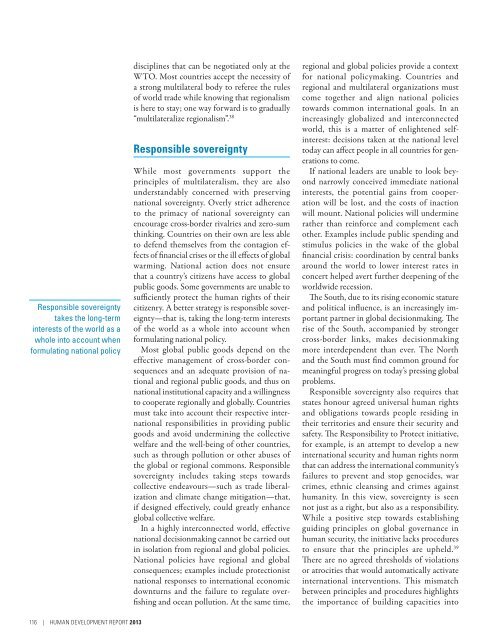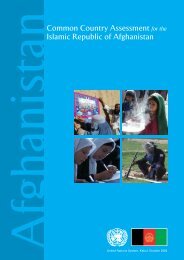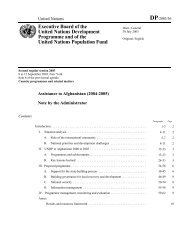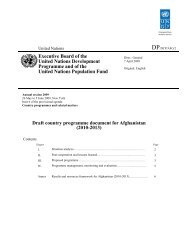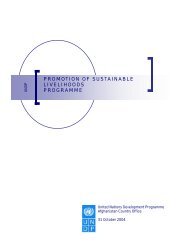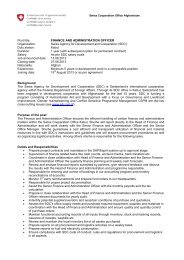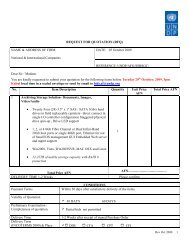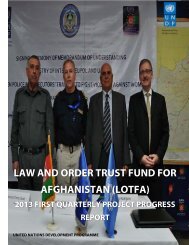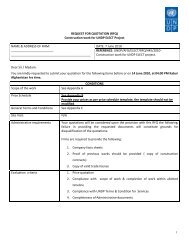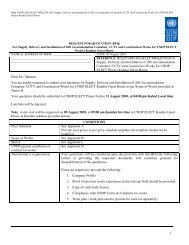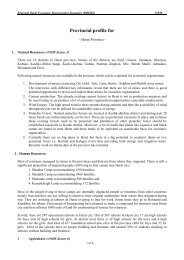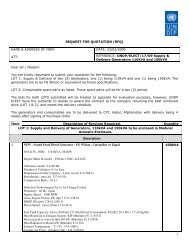E N S W - Human Development Reports - United Nations ...
E N S W - Human Development Reports - United Nations ...
E N S W - Human Development Reports - United Nations ...
Create successful ePaper yourself
Turn your PDF publications into a flip-book with our unique Google optimized e-Paper software.
Responsible sovereignty<br />
takes the long-term<br />
interests of the world as a<br />
whole into account when<br />
formulating national policy<br />
disciplines that can be negotiated only at the<br />
WTO. Most countries accept the necessity of<br />
a strong multilateral body to referee the rules<br />
of world trade while knowing that regionalism<br />
is here to stay; one way forward is to gradually<br />
“multilateralize regionalism”. 38<br />
Responsible sovereignty<br />
While most governments support the<br />
principles of multilateralism, they are also<br />
understandably concerned with preserving<br />
national sovereignty. Overly strict adherence<br />
to the primacy of national sovereignty can<br />
encourage cross-border rivalries and zero-sum<br />
thinking. Countries on their own are less able<br />
to defend themselves from the contagion effects<br />
of financial crises or the ill effects of global<br />
warming. National action does not ensure<br />
that a country’s citizens have access to global<br />
public goods. Some governments are unable to<br />
sufficiently protect the human rights of their<br />
citizenry. A better strategy is responsible sovereignty—that<br />
is, taking the long-term interests<br />
of the world as a whole into account when<br />
formulating national policy.<br />
Most global public goods depend on the<br />
effective management of cross-border consequences<br />
and an adequate provision of national<br />
and regional public goods, and thus on<br />
national institutional capacity and a willingness<br />
to cooperate regionally and globally. Countries<br />
must take into account their respective international<br />
responsibilities in providing public<br />
goods and avoid undermining the collective<br />
welfare and the well-being of other countries,<br />
such as through pollution or other abuses of<br />
the global or regional commons. Responsible<br />
sovereignty includes taking steps towards<br />
collective endeavours—such as trade liberalization<br />
and climate change mitigation—that,<br />
if designed effectively, could greatly enhance<br />
global collective welfare.<br />
In a highly interconnected world, effective<br />
national decisionmaking cannot be carried out<br />
in isolation from regional and global policies.<br />
National policies have regional and global<br />
consequences; examples include protectionist<br />
national responses to international economic<br />
downturns and the failure to regulate overfishing<br />
and ocean pollution. At the same time,<br />
regional and global policies provide a context<br />
for national policymaking. Countries and<br />
regional and multilateral organizations must<br />
come together and align national policies<br />
towards common international goals. In an<br />
increasingly globalized and interconnected<br />
world, this is a matter of enlightened selfinterest:<br />
decisions taken at the national level<br />
today can affect people in all countries for generations<br />
to come.<br />
If national leaders are unable to look beyond<br />
narrowly conceived immediate national<br />
interests, the potential gains from cooperation<br />
will be lost, and the costs of inaction<br />
will mount. National policies will undermine<br />
rather than reinforce and complement each<br />
other. Examples include public spending and<br />
stimulus policies in the wake of the global<br />
financial crisis: coordination by central banks<br />
around the world to lower interest rates in<br />
concert helped avert further deepening of the<br />
worldwide recession.<br />
The South, due to its rising economic stature<br />
and political influence, is an increasingly important<br />
partner in global decisionmaking. The<br />
rise of the South, accompanied by stronger<br />
cross-border links, makes decisionmaking<br />
more interdependent than ever. The North<br />
and the South must find common ground for<br />
meaningful progress on today’s pressing global<br />
problems.<br />
Responsible sovereignty also requires that<br />
states honour agreed universal human rights<br />
and obligations towards people residing in<br />
their territories and ensure their security and<br />
safety. The Responsibility to Protect initiative,<br />
for example, is an attempt to develop a new<br />
international security and human rights norm<br />
that can address the international community’s<br />
failures to prevent and stop genocides, war<br />
crimes, ethnic cleansing and crimes against<br />
humanity. In this view, sovereignty is seen<br />
not just as a right, but also as a responsibility.<br />
While a positive step towards establishing<br />
guiding principles on global governance in<br />
human security, the initiative lacks procedures<br />
to ensure that the principles are upheld. 39<br />
There are no agreed thresholds of violations<br />
or atrocities that would automatically activate<br />
international interventions. This mismatch<br />
between principles and procedures highlights<br />
the importance of building capacities into<br />
116 | HUMAN DEVELOPMENT REPORT 2013


